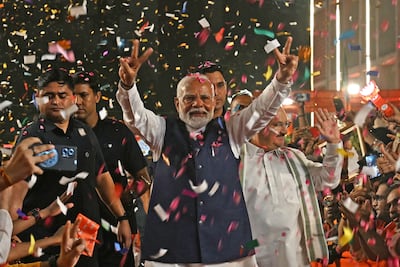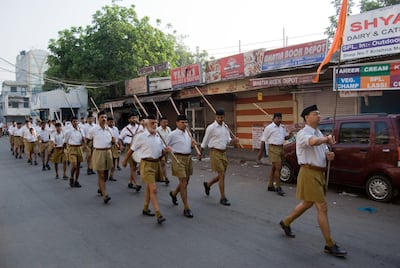The Indian government has lifted a decades-old ban on civil servants joining Rashtriya Swayamsevak Sangh (RSS), a far-right Hindu nationalist paramilitary group that is also the ideological parent of Prime Minister Narendra Modi’s political party.
The RSS was founded in 1925 by Keshav Baliram Hedgewar, who was inspired by Adolf Hitler’s Nazi party. With millions of members, the groups believes that India, a diverse and officially secular country, should be a theological Hindu state.
It has been accused of stoking community tensions in the country through a web of affiliated organisations such as Bajrang Dal and Vishwa Hindu Parishad that promote Hindu nationalism aggressively.
The Indian government banned its employees from joining the RSS in 1966, deeming it a hardline group, along with the Muslim group Jamaat-e-Islami.
RSS was originally banned as an organisation in 1948, following the assassination of India’s iconic freedom movement leader Mahatma Gandhi by Hindu militant Nathuram Godse, who once was part of the paramilitary group.
The ban was lifted a year later but the RSS was outlawed during India's state of emergency from 1975 to 1977, and again over its alleged role in the violence that accompanied the demolition of Babri Mosque in 1992.
The RSS was made legal in 1993, but the ban on government employees from joining remained until the announcement this week.
"It has been decided to remove the mention of Rashtriya Swayamsevak Sangh from the impugned office memorandum dated 30.11.1966, 25.07.1970 and 28.10.1980,” the Ministry of Personnel, Public Grievances and Pension Department of Personnel and Training said in a notice that was released on July 9 but was made available on social media on Monday.

Statements from RSS officials welcomed the move and said the initial ban should not have been put in place.
Amit Malviya, in charge of the ruling Bharatiya Janata Party’s IT cell, confirmed the lifting of the ban which he said was imposed after a massive anti-cow-slaughter protest at the Indian Parliament in 1966.
“The original order shouldn’t have been passed in the first place. The ban was imposed because, on 7 Nov 1966, there was a massive anti-cow-slaughter protest at the Parliament. RSS-Jana Sangh mobilised support in lakhs. Many died in police firing,” he said on X.
Sunil Ambekar, the RSS media head, said the decision was “appropriate and strengthens the democratic system of India".
"For the last 99 years, Rashtriya Swayamsevak Sangh has been continuously involved in the reconstruction of the nation and service to society,” Mr Ambekar said.
“Due to the contribution of the Sangh in national security, unity-integrity and helping society during times of natural disaster, various leaders of the country have praised the role of the Sangh from time to time.”
With the ban lifted, civil servants such as bureaucrats, academicians, police officers, and even judges can become active members of the group. Opposition parties have accused the Modi government of “saffronising” the country, a term used for turning India into a Hindu state.

The RSS believes Hindu national identity was suppressed for centuries under Islamic Mughal and British rule and has advocated transforming India into a Hindu state.
It has been boosted by the election of Mr Modi, himself a lifetime member of the group.
Mr Modi's BJP, which stormed to power in 2014, is seen as the political wing of the RSS and the two organisations have close ideological and institutional ties.
The government’s policies often follow the RSS line on key policies, including decisions such as scrapping the limited autonomy of the disputed Kashmir region, introducing a uniform civil code, constructing Ram Temple and instilling pride among Hindus.
Asaduddin Owaisi, the president of All India Majlis-e-Ittehadul Muslimeen, said any civil servant being connected to the RSS would show a conflict of interest.
“Every RSS member takes an oath that puts Hindutva above the nation. No civil servant can be loyal to the nation if he is a member of RSS," Mr Owaisi posted on X.
“Such a shame, instead of aligning only to Bharat Mata’s interests, BJP is leading them towards keeping ideological interests first,” said Chaturvedi, a parliamentarian from Shiv Sena (UT) party in Maharashtra state.


